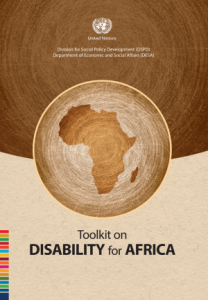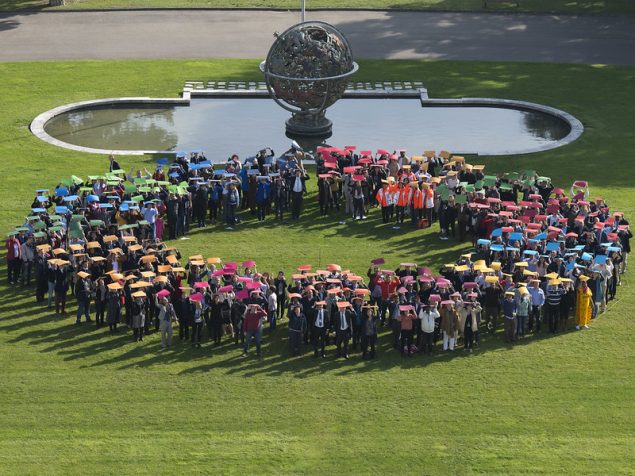World Bank Headquarters, Washington, DC,
28 – 30 June 2010
- Executive Summary
- Conclusions and recommendations
- Report of the meeting
- Resource documents for the meeting
- Background Note
- Background Resource List
- Draft Agenda
Background Note
I. Introduction
The Department of Economic and Social Affairs of the United Nations Secretariat in close collaboration with the World Bank organized at World Bank Headquarters in Washington, DC (USA) an “Expert meeting on environmental and ICT accessibility: innovative and cost-effective approaches to inclusive development” from 28-30 June 2010.
The Expert meeting aimed to promote greater awareness of environmental and ICT accessibility and advancement of persons with disabilities in the context of development, and to identify innovative and cost-effective approaches to accessibility both in the physical environment and in the fields of information and communications technologies as means to further inclusive processes of development.
II. Scope and objectives of the meeting
The Expert meeting provided a forum for intensive exchanges of knowledge and experience relating to norms and standards, institutional arrangements, governance, technologies and actual practice related to accessibility and reasonable accommodation in the physical environments as well as in the fields of information and communication technologies(ICT). Special attention was directed to environmental and ICT accessibility and advancement of persons with disabilities in the context of developing countries. Universal design accorded special attention in the review and analysis of issues, trends and priorities for action in promoting accessibility as a means and goal of development.
Meeting objectives pursued by means of select presentations and round-table discussions of issues, trends, key concepts and practical methods of planning, design and evaluation of accessible environments in countries. Group work focused on examination and identification of (1) strategic frameworks to promote inclusive development and environmental accessibility with reasonable accommodation for all, and (2) priorities for action to strengthen national capacities and institutions and (3) empowerment of persons with disabilities and their communities to participate as agents and beneficiaries in analysis, planning and design, implementation and evaluation of accessible environments in urban and rural areas.
III. Expected outcomes
Meeting participants are expected to produce: (1) recommendations for improving processes of planning, design and evaluation of policies and programmes for cost-effective and sustainable accessibility in the physical environment and in the fields of information and communications technologies with emphasis on developing countries; (2) select set of options to promote awareness and support of environmental accessibility in both development cooperation and development finance activities as an essential means for development for all; (3) select set of “exemplary practice and experience” in environmental accessibility and advancement of persons with disabilities in the context of development; (4) priorities for applied research and capacity building for innovative and cost-effective approaches to environmental accessibility with emphasis on developing countries; and (5) recommendations for increased exchanges of knowledge and experience on environmental accessibility, such as through Internet-enabled “Global community of practice on environmental accessibility”.
Meeting findings and recommendations are expected to (1) promote awareness and enrich the global body of knowledge concerning environmental accessibility in the context of development, (2) contribute to increased networking among concerned stakeholders– governmental, academic and non-governmental as well as the private sector – for practical action concerning accessible environments and inclusive development, and to; (3) contribute to increased resources to build national capacities for catalytic, innovative, cost-effective and sustainable approaches to environmental accessibility in the context of development .
IV. International normative framework on accessibility and development
In the context of global policy discourse on disability and development, accessibility has been a major policy objective in international normative frameworks concerning advancement of persons with disabilities and development since 1990s.
In the late 1990s, the United Nations General Assembly began to identify accessibility as a specific priority in policies and programmes to further equalization of opportunities for persons with disabilities in the context of development. Following the Assembly’s adoption of the Standard Rules on Equalization of Opportunities for Persons with Disabilities in 1993, and the five-year review and appraisal of the World Programme of Action concerning Disabled Persons (1982) in 1997, 2002 and 2007, accessibility has been clearly defined as a means and goal to disability-inclusive development by the Assembly resolutions on this issue.
The adoption of the UN Convention on the Rights of Persons with Disabilities by the United Nations General Assembly in 2006 strengthened the international normative framework for advancement of the rights of persons with disabilities, through its article 9 and its application to all the provisions set out in the Convention. Following the entry into force of the Convention in May 2008, United Nations General Assembly, including the Assembly resolution 63/150, which reaffirmed “the need to include and integrate the rights, well-being and perspective of persons with disabilities in development efforts at the national, regional and international levels, without which the internationally agreed development goals, in particular the Millennium Development Goals, will not be genuinely achieved.” Operative paragraph 4 (b) of the resolution encouraged States to ensure “accessibility and reasonable accommodation to enable persons with disabilities to realize their right to live independently and participate fully in all aspects of life, as well as to be agents and beneficiaries of development.”
Accessibility is thus recognised in both binding and non-binding international instruments as both a means and a goal of participatory and inclusive development : an essential precondition for sustained and equitable development- and universal human rights- for all.
V. Meeting activities
The meeting included the following activities to achieve its objectives:
1. Review of background material prepared for the meeting, particularly the draft technical monograph on accessibility and the Convention, and submit recommendations for further development.
2. Review and submit recommendations for inputs and practical examples of good practice for technical and strategic aspects of background documentation.
3. Review and discuss ways in which environmental accessibility contributes to inclusive development and identify specific options to incorporate environmental accessibility as a priority concern in policies and procedures related to international development cooperation.
4. Review and discuss catalytic and innovative examples to promote increased awareness and support for accessibility with reasonable accommodation in the physical environment and in the fields of information and communications technologies with emphasis on developing countries.
5. Review and discuss measures to promote and ensure sustainability of an international accessibility network – community of practice.
6. Formulate recommendations for dissemination of the meeting outcome and for practical follow-up with emphasis on building national capacities and empowering constituencies for environmental accessibility and advancement of persons with disabilities, women and men alike, in the context of development.
VI. Organizational and participation
The United Nations Department of Economic and Social Affairs, in cooperation with the World Bank, organized an Expert meeting on accessibility: innovative and cost-effective approaches for inclusive development at World Bank Headquarters, Washington, DC (USA) from 28-30 June 2010.
Approximately 12 to15 experts, representing all regions, were invited in their individual capacity to participate in the meeting. Invited experts are expected to contribute a brief participation paper or set of speaking points on environmental accessibility issues and trends in their respective area of expertise.
Representatives of United Nations agencies and organizations, intergovernmental and non-governmental organizations and academic institutions were able participate on their own account as observers.
VI. Language of meeting documentation and proceedings
The working language of the meeting is English. Pre- and in-session meeting documentation were provided in English in accessible formats, through Internet-enabled resources or both.
—




